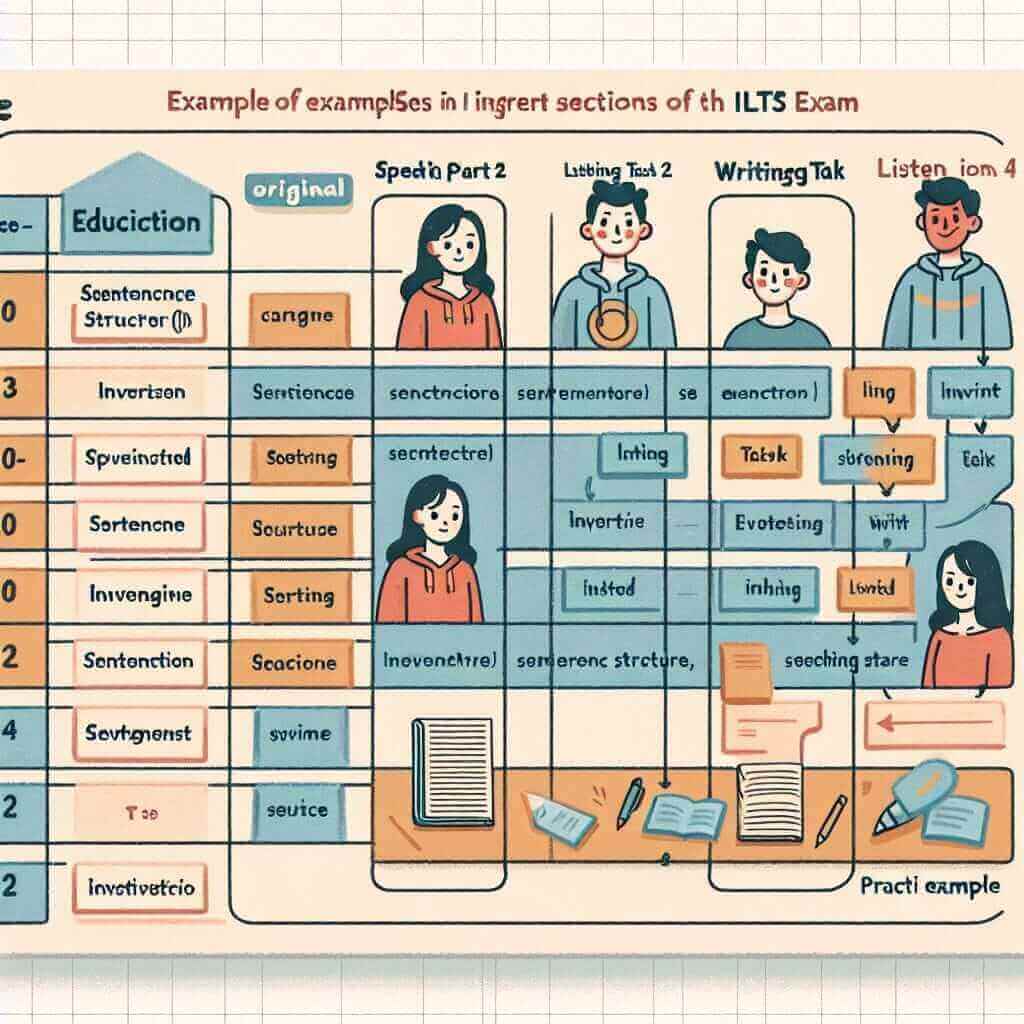Have you ever come across sentences like “Rarely do we encounter such kindness” and wondered why they sound so formal? This unusual word order is a grammatical structure called inversion, and while it might seem intimidating, mastering it can significantly enhance your IELTS writing and speaking scores, pushing you closer to those coveted band 7 and 8 marks.
Let’s look at a few examples of how inversion can be used in different sections of the IELTS exam:
- Speaking Part 2 (Describe a time when you witnessed an act of kindness): “Not only did the stranger help me with my luggage, but he also offered me a ride home.”
- Writing Task 2 (Essay about the importance of community spirit): “Seldom do we realize the strength of our community until we face a crisis together.”
- Listening Section 3 (University lecture about environmental issues): “Under no circumstances should we ignore the impact of climate change on future generations.”
In each of these examples, the inversion adds a touch of sophistication and emphasis to the sentence, demonstrating a strong command of grammatical structures.
Unraveling Inversion: A Closer Look
Inversion occurs when we reverse the typical subject-verb order in a sentence, often for stylistic effect or to emphasize a particular element. This structure is particularly common in formal written English and can elevate your language use in the IELTS exam.
Mastering the Mechanics: Form and Function
Form:
The most common form of inversion involves placing a negative or restrictive adverbial phrase at the beginning of the sentence, followed by an auxiliary verb (do/does/did, have/has/had, can/could, etc.), then the subject, and finally the main verb.
Example:
- Normal sentence: We rarely encounter such kindness.
- Inverted sentence: Rarely do we encounter such kindness.
Function:
- Emphasis: Inversion is often used to emphasize the negative or restrictive element at the beginning of the sentence. For example, “Never have I seen such a beautiful sunset” emphasizes the speaker’s astonishment.
- Formality: Inversion is more common in formal writing and speaking situations, adding a layer of sophistication to your language.
- Variety: Using inversion can add variety and interest to your writing and speaking, preventing it from sounding monotonous.
Inversion in Action: IELTS Examples
Here’s how you can effectively incorporate inversion into different sections of the IELTS exam:
Writing Task 2:
- Original sentence: Many people believe that technology has made our lives easier.
- Inverted sentence: Rarely do people consider the potential downsides of our increasing reliance on technology.
Speaking Part 3:
- Original sentence: I think it’s important for young people to volunteer in their communities.
- Inverted sentence: Not only is volunteering beneficial for the community, but it also helps young people develop valuable life skills.
Listening Section 4:
- Original Sentence: You will hear the lecturer say, “The research has never been more critical.”
- Inverted Sentence: The lecturer emphasizes the importance of the research by stating, “Never before has the research been more critical.”

Level Up Your Language: Advanced Inversion Techniques
To truly impress the IELTS examiner, consider using these advanced forms of inversion:
- Inversion with “so”: “So captivating was the story that I couldn’t put the book down.”
- Inversion with “such”: “Such is the power of music that it can transcend cultural barriers.”
- Inversion with comparative structures: “No sooner had I sat down than the phone rang.”
Common Pitfalls and How to Avoid Them
While inversion can elevate your language, it’s crucial to use it correctly to avoid grammatical errors:
Incorrect: Rarely we encounter such kindness.
Correct: Rarely do we encounter such kindness. (Remember the auxiliary verb!)
Incorrect: Not only he was kind, but he was also generous.
Correct: Not only was he kind, but he was also generous. (Invert the subject and verb after “not only.”)
Conclusion
Mastering inversion can be your secret weapon to achieving a higher IELTS band score. By understanding its form, function, and various applications, you can strategically incorporate this grammatical tool to add sophistication, emphasis, and variety to your language. Remember to practice using inversion in different contexts and pay close attention to the correct word order to avoid common errors.
Now that you’ve unlocked the power of inversion, keep practicing and watch your IELTS scores soar!